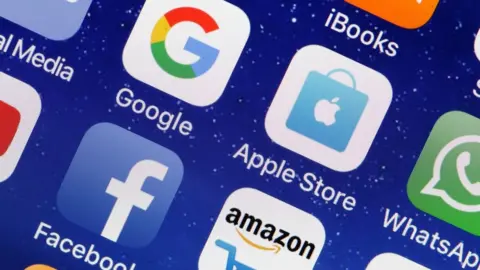EU pushes for new tax on tech giants 'by Christmas'
A new tax on technology giants such as Facebook, Amazon and Google could raise £4.4bn a year across Europe, an EU commissioner has said.
Pierre Moscovici, head of tax for the European Commission, said a deal was "doable by Christmas".
Good progress was being made, he said, in unblocking an issue that has caused controversy around the world.
But he warned that if there was no deal by then, it could be the end of next year before it could be reconsidered.
The year 2019 would be dominated by Brexit, the European Parliament elections in May and the appointment of a new set of Commissioners, and it was "hardly imaginable" a technology tax would be agreed, he said.
"We can lead by example," the man leading the battle to increase taxes on internet giants argued.
"Let's do it now."
Facebook row
Mr Moscovici's move comes days after Facebook faced fresh criticism when it announced it was paying £15.8m tax in the UK, where its sales total £1.3bn.
After a hefty tax credit, Facebook's final bill will be £7.4m.
The push by the EU will also increase pressure on Philip Hammond, the chancellor, who has laid out his own proposals for a new technology tax.
Mr Moscovici needs agreement from all EU members, including Britain at this stage.
He said that two of the leading countries in the EU, Germany and France, had "made it clear" they wanted a deal by the end of the year.
It is clear there are still significant hurdles to overcome.
Two days ago, Ireland, the Czech Republic, Sweden and Finland all raised significant concerns that an EU tax could breach international rules on equal treatment for companies across the world.
Earlier this year, the European Commission published proposals for a 3% tax on the revenues of large internet companies with global revenues above €750m (£660m) a year.
Digital presence
At present, firms like Google, Amazon and Facebook avoid taxes on profits paid by more traditional companies because they do not have a large physical presence in many countries.
Profits are largely declared where the companies have their headquarters - usually America.
The highest level of tax is then paid there.
"Those companies, those internet giants, they pay little or no tax in the EU," Mr Moscovici told me at the International Monetary Fund annual meeting in Bali.
"Why? Because our corporate tax system is old.
"Is is not their fault. It is our fault. We have a tax system based on physical presence.
"We need to reflect on digital presence.
"If you compare all businesses, 23% is the average corporate tax rate. For the internet, it is something like 9%. This is a problem of a level playing field."
 Chesnot/Getty Images
Chesnot/Getty ImagesMr Moscovici said he was willing to support a "sunset clause" to achieve agreement.
That would mean that any EU tech tax would be temporary until international bodies such as the Organisation for Economic Co-operation and Development (OECD) agreed a similar type of system applicable to all countries.
Such a move could ease concerns from member states that a new tax could damage the wider economy and make investing in the EU less attractive.
Although with America unlikely to agree any system which appears to penalise US success stories over other companies, international agreement still appears a long way off.
"The impact is quite limited - bringing in about €5bn a year," Mr Moscovici said of the EU plan.
"Frankly, if you compare that with the profits of those companies, they are not going to be ruined. I think we can find common ground [in the EU]."
Mr Moscovici said that the UK was supportive of the EU's moves as long as they did not appear protectionist.
Brexit and tax
He said he did not want to "improvise" on what would happen once Britain's planned departure from the EU takes place next March.
But he did point out that Britain had pushed for international agreement to tax large digital companies at a higher level.
On Brexit, Mr Moscovici said that the only scenario that Brussels was working on was "to try and get a good deal on time".
"Clearly we need to look for a solution that is close, co-operative and friendly," he said.
He also said that trade tensions with the US had eased and that both sides were now "talking" after the political rows that erupted earlier in the year, when President Donald Trump attacked the EU's trade policies.
"I think he's wrong economically, I think he's wrong politically," Mr Moscovici said of President Trump's argument that present free-trade deals around the world were bad for America,.
"I think we need to seek co-operation at the world level."
